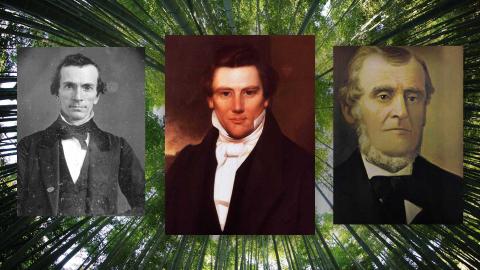You are here
Book of Mormon Central is in the process of migrating to our new Scripture Central website.
We ask for your patience during this transition. Over the coming weeks, all pages of bookofmormoncentral.org will be redirected to their corresponding page on scripturecentral.org, resulting in minimal disruption.

D&C 64–66
New from BMC
Watch videos from Gospel scholars and teachers to learn more about these sections of the Doctrine and Covenants. Book of Mormon Central produces weekly videos from Tyler Griffin, Taylor Halverson, John Hilton III, Anthony Sweat, Casey Griffiths, Stephanie Dibb Sorensen and Marianna Richardson. Read commentaries and other resources from KnoWhys, Steven C. Harper, Casey Griffiths, and Susan Easton Black.
Overview
Doctrine and Covenants 64
Doctrine and Covenants 65
Doctrine and Covenants 66
Daily Reading Plan
Structure your personal scripture study by following a 15-minute, day-by-day plan. Each day's assignment includes the required scripture passages from the Come, Follow Me curriculum, as well as suggestions for additional resources to bring context and understanding to your study. For the best experience, use our Reading Plan in the free ScripturePlus app! You can track your progress and have access to the best resources.
Monday
- Commentary: Section 64 Context, Steven C. Harper
- Scripture: D&C 64:1–7
- Commentary: Casey Paul Griffiths, Doctrine and Covenants Minute, Doctrine and Covenants 64:1–5.
-
Quote: While speaking to elders assembled in Kirtland, the Lord said, “I will that ye should overcome the world; wherefore I will have compassion upon you” (D&C 64:2). The Lord knows our weakness and the eternal consequences of “the world” upon imperfect men and women. The word wherefore in this verse is His affirmation that it is only by virtue of His compassion that we may ultimately “overcome the world.” How is that compassion made manifest? To these same elders in Kirtland, He said, “I have forgiven you your sins “ (D&C 64:3). The Savior wants to forgive.
Craig A. Cardon, “The Savior Wants to Forgive,” April 2013 General Conference. - Video: Forgive Others - Taylor Halverson (D&C 64)
Tuesday
- Scripture: D&C 64:8–14
- Commentary: Casey Paul Griffiths, Doctrine and Covenants Minute, Doctrine and Covenants 64:6–11.
-
Quote: I would like to make it clear that forgiveness of sins should not be confused with tolerating evil. In fact, in the Joseph Smith Translation, the Lord said, “Judge righteous judgment” (Joseph Smith Translation, Matthew 7:1). The Savior asks us to forsake and combat evil in all its forms, and although we must forgive a neighbor who injures us, we should still work constructively to prevent that injury from being repeated. A woman who is abused should not seek revenge, but neither should she feel that she cannot take steps to prevent further abuse. A businessperson treated unfairly in a transaction should not hate the person who was dishonest but could take appropriate steps to remedy the wrong. Forgiveness does not require us to accept or tolerate evil. It does not require us to ignore the wrong that we see in the world around us or in our own lives. But as we fight against sin, we must not allow hatred or anger to control our thoughts or actions.
The Savior said, “Wherefore, I say unto you, that ye ought to forgive one another; for he that forgiveth not his brother his trespasses standeth condemned before the Lord; for there remaineth in him the greater sin” (D&C 64:9)
This is not to say that forgiveness is easy. When someone has hurt us or those we care about, that pain can almost be overwhelming. It can feel as if the pain or the injustice is the most important thing in the world and that we have no choice but to seek vengeance. But Christ, the Prince of Peace, teaches us a better way. It can be very difficult to forgive someone the harm they’ve done us, but when we do, we open ourselves up to a better future. No longer does someone else’s wrongdoing control our course. When we forgive others, it frees us to choose how we will live our own lives. Forgiveness means that problems of the past no longer dictate our destinies, and we can focus on the future with God’s love in our hearts.
David E. Sorenson, “Forgiveness Will Change Bitterness to Love,” April 2003 General Conference. -
Quote: One of the most Godlike expressions of the human soul is the act of forgiveness. Everyone is wronged at some point by someone, and many suffer serious wrongs. Christians everywhere stand in awe of those pioneers who have climbed that steep slope to the spiritual summit attained by those who have heeded the Savior’s command to forgive all men (See Matthew 6:14–15; D&C 64:9–10). Forgiveness is mortality’s mirror image of the mercy of God.
Dallin H. Oaks, “Modern Pioneers,” October 1989 General Conference. -
Quote: We hope and pray that you will go from this conference to your homes feeling in your hearts and from the depths of your souls to forgive one another, and never from this time forth to bear malice toward another fellow creature. We ought to say in our hearts, let the Lord judge between me and thee (D&C 64:11) but as for me, I will forgive. Go home and dismiss envy and hatred from your hearts; dismiss the feeling of unforgiveness; and cultivate in your souls that spirit of Christ that cried out upon the cross, “Father, forgive them; for they know not what they do” (Luke 23:34). This is the spirit that the Latter-day Saints ought to possess all the day long. It is a good thing to be at peace with the Lord.
Joseph Fielding Smith, “The Purpose of Man's Mortal Existence,” October 1969 General Conference.
Wednesday
- Scripture: D&C 64:15–22
- Commentary: Casey Paul Griffiths, Doctrine and Covenants Minute, Doctrine and Covenants 64:12–17.
- Commentary: Casey Paul Griffiths, Doctrine and Covenants Minute, Doctrine and Covenants 64:18–22.
- Bio: Ezra Booth, Susan Easton Black
- Bio: Isaac Morley, Susan Easton Black
Thursday
- Scripture: D&C 64:23–32
- Commentary: Casey Paul Griffiths, Doctrine and Covenants Minute, Doctrine and Covenants 64:23–25.
- Commentary: Casey Paul Griffiths, Doctrine and Covenants Minute, Doctrine and Covenants 64:26–33.
- Video: Answers to Prayers - Casey Griffiths (D&C 64–66)
Friday
- Scripture: D&C 64:33–43
- Commentary: Casey Paul Griffiths, Doctrine and Covenants Minute, Doctrine and Covenants 64:34–36.
- Commentary: Casey Paul Griffiths, Doctrine and Covenants Minute, Doctrine and Covenants 64:37–40.
- Commentary: Casey Paul Griffiths, Doctrine and Covenants Minute, Doctrine and Covenants 64:41–43.
-
Quote: Remember the qualifying statement of the Master, “Behold, the Lord requireth the heart and a willing mind” (D&C 64:34). A latter-day minister advised: “Until willingness overflows obligation, men fight as conscripts rather than following the flag as patriots. Duty is never worthily performed until it is performed by one who would gladly do more if only he could.”
Thomas S. Monson, “The Army of the Lord,” April 1979 General Conference.
Saturday
- Commentary: Section 65 Context, Steven C. Harper
- Scripture: D&C 65:1–6
- Commentary: Casey Paul Griffiths, Doctrine and Covenants Minute, Doctrine and Covenants 65:1–2.
- Commentary: Casey Paul Griffiths, Doctrine and Covenants Minute, Doctrine and Covenants 65:3–6.
Sunday
- Commentary: Section 66 Context, Steven C. Harper
- Scripture: D&C 66:1–13
- Commentary: Casey Paul Griffiths, Doctrine and Covenants Minute, Doctrine and Covenants 66:1–4.
- Commentary: Casey Paul Griffiths, Doctrine and Covenants Minute, Doctrine and Covenants 66:5–9.
- Commentary: Casey Paul Griffiths, Doctrine and Covenants Minute, Doctrine and Covenants 66:10–13.
Bibliography
Doctrine and Covenants 64
Steven C. Harper, “Section 64,” Doctrine and Covenants Contexts (Springville, UT: Book of Mormon Central, 2021), 147–148.
Susan Easton Black, “Forgiveness - Insight Into D&C 64,” Restoration Voices Volume 2: Insights and Stories of the Doctrine and Covenants (Springville, UT: Book of Mormon Central, 2021).
Matthew McBride, “Ezra Booth and Isaac Morley,” Revelations in Context: The Stories Behind the Sections of the Doctrine and Covenants. Salt Lake City, UT: The Church of Jesus Christ of Latter-day Saints, 2016.
“The Gift Has Returned,” Saints, Volume 1: The Standard of Truth (Salt Lake City, UT: The Church of Jesus Christ of Latter-day Saints, 2018), 1:136–137.
“Bishop,” Church History Topics.
“Restoration of the Melchizedek Priesthood,” Church History Topics.
“Zion/New Jerusalem,” Church History Topics.
D&C 64:8–10
Sharon Anderson, “Brother William,” in The Glory of the Son (Orem, UT: Time-Lines Etc., 2019), 68.
D&C 64:15–16
Susan Easton Black, “Ezra Booth,” Restoration Voices Volume 1: People of the Doctrine and Covenants (Springville, UT: Book of Mormon Central, 2021).
Susan Easton Black, “Isaac Morley,” Restoration Voices Volume 1: People of the Doctrine and Covenants (Springville, UT: Book of Mormon Central, 2021).
D&C 64:17
Susan Easton Black, “Edward Partridge,” Restoration Voices Volume 1: People of the Doctrine and Covenants (Springville, UT: Book of Mormon Central, 2021).
D&C 64:18–19
Susan Easton Black, “Algernon Sidney Gilbert,” Restoration Voices Volume 1: People of the Doctrine and Covenants (Springville, UT: Book of Mormon Central, 2021).
D&C 64:21
Susan Easton Black, “Frederick G. Williams,” Restoration Voices Volume 1: People of the Doctrine and Covenants (Springville, UT: Book of Mormon Central, 2021).
D&C 64:23
Casey Paul Griffiths, “’A Covenant and a Deed Which Cannot Be Broken’: The Continuing Saga of Consecration,” in Foundations of the Restoration: Fulfillment of the Covenant Purposes, eds. Craig James Ostler, Michael Hubbard MacKay, and Barbara Morgan Gardner (Salt Lake City and Provo, UT: Deseret Book and the BYU Religious Studies Center, 2016).
Book of Mormon Central. “Why Does the Lord Require People to Live the Laws of Tithing and Fasting? (3 Nephi 24:10).’’ KnoWhy 305 (April 26, 2017).
D&C 64:26
Susan Easton Black, “Newel K. Whitney,” Restoration Voices Volume 1: People of the Doctrine and Covenants (Springville, UT: Book of Mormon Central, 2021).
D&C 64:41–43
Book of Mormon Central, “Why Does Zion Flourish in the Wilderness? (1 Nephi 2:2),” KnoWhy 362 (September 7, 2017).
Sharon Anderson, “Raising the Standard,” in The Glory of the Son (Orem, UT: Time-Lines Etc., 2019), 71.
Doctrine and Covenants 65
Steven C. Harper, “Section 65,” Doctrine and Covenants Contexts (Springville, UT: Book of Mormon Central, 2021), 149–151.
Susan Easton Black, “Stone Cut Out Without Hands - Insight Into D&C 65,” Restoration Voices Volume 2: Insights and Stories of the Doctrine and Covenants (Springville, UT: Book of Mormon Central, 2021).
Matthew McBride, “William McClellan's Five Questions,” Revelations in Context: The Stories Behind the Sections of the Doctrine and Covenants. Salt Lake City, UT: The Church of Jesus Christ of Latter-day Saints, 2016.
D&C 65:2
Sharon Anderson, “Daybreak,” in The Glory of the Son (Orem, UT: Time-Lines Etc., 2019), 76.
Doctrine and Covenants 66
Steven C. Harper, “Section 66,” Doctrine and Covenants Contexts (Springville, UT: Book of Mormon Central, 2021), 152–154.
Susan Easton Black, ““Mine Everlasting Covenant” - Insight Into D&C 66,” Restoration Voices Volume 2: People of the Doctrine and Covenants (Springville, UT: Book of Mormon Central, 2021).
Matthew McBride, “William McClellan's Five Questions,” Revelations in Context: The Stories Behind the Sections of the Doctrine and Covenants. Salt Lake City, UT: The Church of Jesus Christ of Latter-day Saints, 2016.
Susan Easton Black, “William E. McClellan,” Restoration Voices Volume 1: People of the Doctrine and Covenants (Springville, UT: Book of Mormon Central, 2021).
D&C 66:1
Sharon Anderson, “Turning,” in The Glory of the Son (Orem, UT: Time-Lines Etc., 2019), 85.
D&C 66:8
Susan Easton Black, “Samuel Harrison Smith,” Restoration Voices Volume 1: People of the Doctrine and Covenants (Springville, UT: Book of Mormon Central, 2021).




















